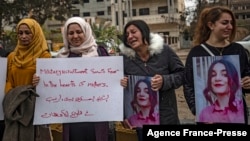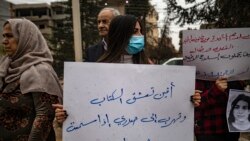Dozens of Kurdish parents and activists protested outside the United Nations offices in Qamishli, Syria, on Sunday against the recruitment of children by local military groups.
The demonstration took place after several teenage girls were reportedly recruited by groups affiliated with the Syrian Democratic Forces (SDF), a Kurdish-led military organization that has been a key U.S. ally in the battle against Islamic State.
In June 2019, the SDF signed a joint action plan with the U.N. to end and prevent the recruitment and use of children under the age of 18 in areas under its control. But the U.N. said since then, at least 160 cases have been documented.
Balqis Hussein, 40, said her 15-year-old daughter has been missing for nine days.
"My daughter is underage. I don’t want her to be recruited and hold weapons. I just want her to return home," Hussein told VOA.
Khaled Jabir, co-chairman of the child protection unit at the Kurdish-led Autonomous Administration in North and East Syria, confirmed that his office recently received several complaints about child recruitment.
“In the past few days, we received five complaints from parents about the disappearance of their children,” he told VOA, noting that “our office has already facilitated the release of one of the girls on Sunday.”
Child recruiting is a big problem, according to Jabir, and local governments reject the practice. According to Jabir, the child protection unit has helped 213 recruited children return to their families since October 2020.
Kidnappings
The Revolutionary Youth, a controversial group affiliated with the Democratic Union Party (PYD), the de facto ruling party in northeastern Syria, has been accused by several parents of the missing girls of being behind their recruitment.
“I know for certain that my daughter has been kidnapped by the Revolutionary Youth, because one of the taken girls who was released on Sunday told us they were in the custody of the Revolutionary Youth,” Hussein said, adding that the group has been “responsible for such abductions in the past.”
“If they released her friend, why don’t they release my daughter and the rest of the girls?” Hussein asked.
VOA has attempted to contact the Revolutionary Youth but has yet to receive a response.
“I’ve contacted many senior officials of PYD and SDF, including the office of Mazloum Abdi,” Hussein said, referring to SDF’s general commander. “They all gave promises, but we haven’t seen anything yet.”
Jabir, of the child protection unit, said efforts to gain the release of the remaining four girls are under way.
U.S. pressure
The SDF has been placed under a "human rights microscope" by the U.S., according to Nicholas Heras, a senior analyst at the Newlines Institute for Strategy and Policy.
“There is significant pressure in Washington that is put on the U.S. military to ensure that the SDF meets certain basic human rights standards, such as prohibitions against recruiting child soldiers,” he told VOA.
“The purpose of the U.N. action plan was to create a way to measure and evaluate the SDF's adherence to international human rights norms, not as an end state in itself,” he added.
Heras continued, “The U.S. Congress can take a lead role in ensuring that the SDF adheres to international norms against recruiting child soldiers by tying American security assistance to the SDF based on clear proof that the SDF is meeting the U.N. goals.”
This article originated in VOA’s Kurdish Service.





